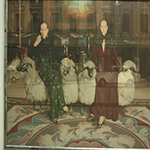Euroacademia Conferences
 Europe Inside-Out: Europe and Europeanness Exposed to Plural Observers (9th Edition) April 24 - 25, 2020
Europe Inside-Out: Europe and Europeanness Exposed to Plural Observers (9th Edition) April 24 - 25, 2020 Identities and Identifications: Politicized Uses of Collective Identities (9th Edition) June 12 - 13, 2020
Identities and Identifications: Politicized Uses of Collective Identities (9th Edition) June 12 - 13, 2020 8th Forum of Critical Studies: Asking Big Questions Again January 24 - 25, 2020
8th Forum of Critical Studies: Asking Big Questions Again January 24 - 25, 2020 Re-Inventing Eastern Europe (7th Edition) December 13 - 14, 2019
Re-Inventing Eastern Europe (7th Edition) December 13 - 14, 2019 The European Union and the Politicization of Europe (8th Edition) October 25 - 26, 2019
The European Union and the Politicization of Europe (8th Edition) October 25 - 26, 2019 Identities and Identifications: Politicized Uses of Collective Identities (8th Edition) June 28 - 29, 2019
Identities and Identifications: Politicized Uses of Collective Identities (8th Edition) June 28 - 29, 2019 The European Union and the Politicization of Europe (7th Edition) January 25 - 26, 2019
The European Union and the Politicization of Europe (7th Edition) January 25 - 26, 2019 7th Forum of Critical Studies: Asking Big Questions Again November 23 - 24, 2018
7th Forum of Critical Studies: Asking Big Questions Again November 23 - 24, 2018 Europe Inside-Out: Europe and Europeanness Exposed to Plural Observers (8th Edition) September 28 - 30, 2018
Europe Inside-Out: Europe and Europeanness Exposed to Plural Observers (8th Edition) September 28 - 30, 2018 Identities and Identifications: Politicized Uses of Collective Identities (7th Edition) June 14 - 15, 2018
Identities and Identifications: Politicized Uses of Collective Identities (7th Edition) June 14 - 15, 2018
The Prestige of Westernization: “Among people”- Roma Students in a Village from Northern Romania
-
-

-
Presentation speakers
- Casiana Pascariu, Washington State University, USA
- Download presentation
Abstract:
For the past decades academic work about Gypsy/Roma has increased dramatically, especially since the collapse of Communism in the East block and the adherence of eastern countries to the European Union, which allowed Roma to travel more in west Europe. One of the central arguments in Romani studies is that the value system of Roma is based on a sui generis system and they must be understood from this perspective (Stewart, 1997). Because of their distinct belief system, many believe they cannot be integrated in the modern European society and are despised by their dominant society. The researcher argues that the Roma who collaborated in this study do not have a different set of values from non-Roma and they ‘want in’ (Gmelch, 1985). Even though the focus of this project is not on the exotic Romani-speaking Roma, my informants are still seen in their community and country as a ‘pure Roma’ (Acton, 1974). The data collected is based on interviews and participant-observation conducted in the summer of 2013 in a village from the Northern Romania. The conclusions are: that the Roma students want to live ‘among people’, want the western life that Romania adopted and consequently their peers at school, and that their dominant society wants to integrate them. -
Related Presentations


















